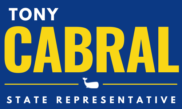MASSACHUSETTS HOUSE PASSES ECONOMIC DEVELOPMENT BILL WITH CABRAL-SPONSORED PROJECTS
July 15, 2022
BOSTON, MA – Yesterday, State Representative Antonio F.D. Cabral (D-New Bedford) successfully added several critical provisions to this session’s economic development bill. Passed Thursday night by the House of Representatives, the bill provides funding for several local capital projects in New Bedford that Rep. Cabral has long prioritized.
The bill, which utilizes American Rescue Plan Act (ARPA), Fiscal Year 2022 (FY22) surplus funds, and bonds, makes significant investments across several vital sectors of the economy while continuing to address disparities exacerbated by the COVID-19 pandemic by making substantial one-time investments in health and human services, the environment and climate mitigation, economic development, housing, and food insecurity.
“New Bedford residents will soon be receiving much needed financial relief through the reforms proposed in this legislation, which will give a boost to our residents who continue to be hit hard by the pandemic, as well as the organizations in this City that promote economic activity and stability. I know how much these organizations mean to New Bedford and the funding I helped secure will go a long way in ensuring their continued success,” stated Rep. Cabral.
The bond authorizations for New Bedford and South Coast-based projects include:
- $5,000,000 for the Zeiterion Performing Arts Center to help complete their capital investment plan to turn the theater into the premier performance venue in the region
- $500,000 for the Azorean Maritime Heritage Society to build a “Casa Does Botes” Boathouse and provide boat storage, maintenance, and educational workshop space in Clark’s Cove to help preserve their three 40-ft, authentic wood Azorean whaleboats.
The American Rescue Plan Act (ARPA) funded projects include:
- $250,000 for Groundwork Southcoast to support and expand their community garden and urban farming projects.
- $250,000 for traffic signals and roadway improvements at the intersection of Hathaway Road and Rockdale Avenue
- $250,000 for the Greater New Bedford Community Health Center to help them expand their mental health services
“Throughout Massachusetts, communities are experiencing the continued effects of the COVID-19 pandemic. Here, in the Legislature, we aimed to tailor this bill in a way that addressed these economic challenges head on, utilizing a regional approach that acknowledges the real inequities communities like New Bedford face,” said Rep. Cabral. “Our Gateway Cities are in need of state investment, now more than ever. These proposed investments of over $4.2 billion further strengthen our commitment to ensuring stronger communities and equitable economic recovery.”
As the House Chair of the Gateway Cities Legislative Caucus, Rep. Cabral worked with his colleagues to secure a one-time $57 million distribution in FY23 for the Housing Development Incentive Program (HDIP) – a housing development program designed specifically for Gateway Cities to address the housing crisis and draw investment into neighborhoods that struggle to find support. This one-time infusion of support will eliminate the 6-year backlog of projects and lead to an estimated 12,000 new housing options over the next 10 years. Moving forward after FY23, the cap on this tax incentive program increases from its current $10 million to $30 million per year enabling further housing development in Gateway City communities.
The House’s economic development bill also provides economic relief to lower and middle-class families in Massachusetts by including the following provisions:
- For middle class residents earning between $38,000 and $100,000 per year – and families earning $38,000 to $150,000 per year – the bill includes one-time rebates of $250 for individual tax filers, and $500 for married joint filers. These one-time rebates will not be subject to state’s personal income tax.
- Increasing the Child and Dependent Care Credit from $180 per child to $310 per child, as well as eliminating the current cap of $360 for two or more children.
- Increasing the Earned Income Tax Credit (EITC) from 30 percent to 40 percent of the federal credit. This is expected to impact about 396,000 taxpayers with incomes under $57,000.
- Increasing the Senior Circuit Breaker Tax Credit from $750 to $1,755.
- Increasing the rental deduction cap from $3,000 to $4,000. This is expected to impact about881,000 taxpayers.
- Allowing the Massachusetts Lottery to sell certain products online – for which a portion of the proceeds will fund an Early Education and Care Fund to develop a sustainable, high-quality, and affordable childcare system in Massachusetts.
